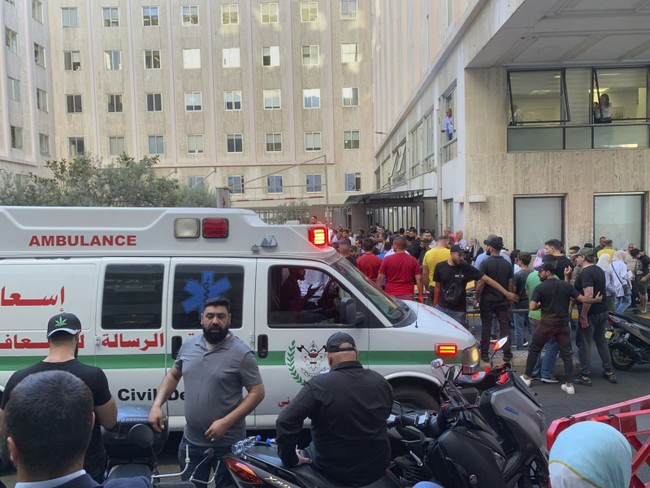
Operation 1980s Called And Want Their Tech Back may not yet have ended. According to multiple reports, a second wave of explosions have taken place in Lebanon, primarily in Hezbollah strongholds in Beirut and the Bekaa Valley. This time, the explosions have been created by “networked devices” and possibly walkie-talkies.
The BBC has begun tracking these reports in a live blog, and has an image of smoke plumes rising over Beirut. And this might not be a coincidence to yesterday’s pagercide:
A security source now tells Reuters that hand-held radios have been targeted in the latest attacks in Lebanon.
A source also says Hezbollah bought the radios five months ago, at the same time as the pagers that exploded yesterday.
The Jerusalem Post suggests that “networked devices” may have gotten detonated in some fashion. Hezbollah has now warned all its personnel to stop using all communications devices, they report:
According to unconfirmed reports, Hezbollah has told its operatives to distance itself from communication devices.
Hezbollah also told its members to dispose of all devices containing a lithium battery or that are connected to the internet.
Reuters later quoted senior Hezbollah official Hashem Safieddine as saying the terror group was in a “new phase” and a “punishment is certainly coming.[“]
New phase? That’s undeniably true, but Hezbollah may not realize yet what this new phase means. A punishment should be coming, but Hezbollah should direct it to the idiots who acquired and distributed all of these low-tech devices without determining whether anyone had tampered with them.
Also: It’s hard to organize a “punishment” against an armed enemy in the 21st century when you have to communicate with smoke signals and carrier pigeons.
So far the reports have been sketchy, but all of them point to a larger operation for the second day in a row:
Ali Hashem, a journalist based in Lebanon, wrote on X: “Another round of blasts in different areas around south Lebanon and Beirut southern suburb. Devices in cars, motorcycles, and people’s hands are exploding.”
It comes after videos from Beirut’s southern suburbs showed people lying on the pavement with wounds on their hands or near their trouser pockets.
NBC News also reports that official Lebanese sources make clear that this new wave hit a broad number of targets. They also report that the Biden administration has concluded that Israel is responsible for yesterday’s attack, but are not yet clear why they launched it:
According to Lebanon’s National News Agency, “a number” of wounded people had been taken to hospitals in the southern suburbs of Beirut after their wireless pagers exploded.
Two U.S. officials said Israel was behind the attack targeting Hezbollah with exploding pagers on Tuesday. The militant group and Lebanese officials also pinned blame on Israel for the explosions, though Israel has not taken responsibility publicly.
It was unclear why Israel carried out the attack when it did and whether it was an opportunistic operation or something more strategic that would be followed by other actions, the officials said.
The who is obvious, although why the Biden administration would discuss it publicly is somewhat inexplicable. The why, at least in strategic terms, is less clear. This would have made complete sense as the start of an IDF offensive in southern Lebanon by taking out as much of Hezbollah’s command and control as possible. Hezbollah has already essentially ended its ability to respond in real time, but that may not last long; the Iranians are no doubt rushing to fill the gap with their own systems …. perhaps after an additional inspection or two to see if those have been compromised. (I’ll have more on that later.)
So why hasn’t Israel opened up a new offensive in Lebanon? The first wave of the pager operation clearly succeeded beyond any wildest dreams; Hezbollah may have lost 25% or more of its active ranks, mainly in leadership and command positions. It’s an operation designed as an opening move in a major offensive. So why hasn’t Israel stepped off into Lebanon yet?
According to the Times of Israel, they may have felt forced to pull the trigger not for operational purposes, but to keep the pager operation from being exposed:
Israel caused thousands of Hezbollah terror group pagers to explode Tuesday, killing nine people and wounding nearly 3,000, amid fears that Hezbollah was about to uncover that the devices had been tampered with, according to Wednesday reports.
Israeli intelligence services originally wanted to detonate the pagers as an opening blow in an all-out war against Hezbollah, Axios reported, citing American and Israeli officials. They chose to act early, however, when a Hezbollah member became suspicious of the devices and planned to alert his superiors, Al-Monitor reported.
Just days earlier, a different Hezbollah member had come to suspect the devices had been tampered with, and then he was killed, Al-Monitor said.
Upon learning of the suspicions, Israeli leaders reportedly considered launching an immediate full-scale war in order to retain the pager attack as an opening blow. They also considered leaving things as they were, even at the risk of the operation being compromised, according to the Al-Monitor report.
It will take Hezbollah at least several days to restore chains of command, so the window is still open. But if this was done as a way to prevent the trap from being exposed, it could still work to force Hezbollah and Iran into retreating from their year-long proxy war against Israel via diplomatic means. The next few days will tell whether mass pagercide will create some breathing room for a deal, or whether Israel will act to deal with Iran’s most dangerous proxy in the region.
In the meantime, I’ll update this post as more data emerges, or follow up later with more analysis. Keep your pagers handy — er, stay tuned.
Update: CNN hears that the walkie-talkies are the devices blowing up, but their source says the impact will be more limited:
Preliminary information suggested that there were between 15 to 20 explosions in southern suburbs of Beirut, and a further 15 to 20 blasts in southern Lebanon, the source said.
The walkie-talkies are less widely used than the pagers that blew up on Tuesday, as they had only been distributed among people organizing crowds, such as funerals and marches, the source said.
That makes sense. Normal walkie-talkies on civilian bands have a very limited range. Had they been military-grade radios on non-commercial frequencies, that may have been different. But who’s to say that Israel hasn’t tampered with those, too?
Update: This update from the Times of Israel is too good to be believed, except that CNN apparently heard the same thing. I joked yesterday that Hezbollah must have bought all their pagers from ACME, but now I’m not so sure it’s a joke:
Lebanese security sources say the handheld radios that exploded this afternoon were purchased by the Hezbollah terror group about five months ago at the same time as the thousands of pagers that exploded yesterday.
Are you kidding me? Hezbollah bought all of their new equipment from a single source and didn’t check any of it? Man, the Mossad owes their leadership a fruit basket. Sans explosive, of course.
Update: If it’s true that Hezbollah got the radios from the same source as the pagers, why would they have used the radios after yesterday? If that’s true, it’s almost intentional incompetence. One has to wonder whether Hezbollah’s field troops are wondering whether they have been stabbed in the back by their own leadership. I doubt they have much confidence in it today, at least.
Update: The casualty count thus far is one dead and over 100 injured, according to CNN’s report from Lebanon’s health ministry. That’s a pretty significant second wave.







